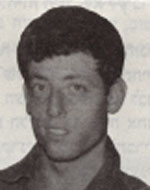Haim (Haimka), son of Ruchama and Jacob, was born on 25.2.1949 in Kibbutz Givat Hashlosha, the youngest son of his parents and veteran residents. He was born sickly and small and spent many of his first years in hospitals. As a toddler, he was shorter than his friends and they had a great deal of fun, but he succeeded in his will, in his talents, and in the quiet that characterized him all his life, to win first place among his friends. He was five and a half when he entered school, and there, too, the youngest was among his brightest friends. He was the first in class to study, and was loved by his friends. Since he liked to organize trips and camps, his friends were happy to impose these duties on him. He was also an outstanding basketball player. From his childhood he excelled in his integrity, dedication and personal example in every field of action. Haimka was thirsty with an excellent perception. He was usually bored in class, for it took only a few minutes to understand the contents of the entire lesson. In 11th grade, he studied at Ein Harod, where he excelled in his ability, talents, and independence of thought and practice. When he returned to the kibbutz, he decided to pass the matriculation exams on his own. After a day of work, activities with the children’s company and a few hours of sleep, he worked on his books and passed exams, with very good grades. Haim was drafted into the Israel Defense Forces in early June 1967 and volunteered for the Armored Corps, completing a tank commanders’ course, after which he completed a tank commander course, followed by an officer’s course and an armored officer course, which he completed as an outstanding trainee. An armored company was one of the best young commanders in the army. During the War of Attrition, Haimka was burned on both legs while rescuing a tank and spent a month in Hadassah Hospital in Jerusalem. When he left the hospital he had some disability, but he vehemently refused to change his medical profile. He returned to serve in a combat unit and succeeded in overcoming his wounds by force of his will. His soldiers testify that he never sent others to do hard work. When he was already a lieutenant commander, he would go out with his soldiers to work. No one could see the company commander cleaning surfaces and the whole company as one man was engaged in the task, and his attitude toward his subordinates was very paternal. He took care of their families and vacations and visited them and took care of their needs. In August 1970, after he was discharged from the army, Haimke coordinated the kibbutz’s outdoor summer camp and collected cotton, and his love for learning and his thirst for knowledge forced him to leave the kibbutz and went to study electrical engineering at the Technion branch in Be’er Sheva. During his studies he married his girlfriend Mika, who joined him for life and studies in Be’er Sheva, where he completed his first two years of studies at the University of Be’er Sheva, where he worked as a physics teacher at the Dimona High School, where he was one of the most admired teachers and on holidays he worked as a driver, and on Yom Kippur, when the war broke out, he stayed in Jerusalem. He did not stop the fast, ate nothing, and ran to his unit to get ahead of his soldiers, and he arrived at the unit dressed in civilian clothes, with no ID plates, and without personal equipment, and immediately prepared his own tanks. His hands were the first four tanks he headed to the Golan Heights B commanded the force quietly and did not lose its calm in the face of the Syrian sea of armor and the fire of hell that had been inflicted on his unit. On the 11th of Tishrei 5740 (October 7, 1973) he fell in battle. Haimke was brought to rest in the cemetery in Petach Tikvah, leaving behind a wife, parents and two brothers, and was promoted to the rank of Captain. His commanders defined him as an excellent officer with professional knowledge, control, leadership, courage and love.
